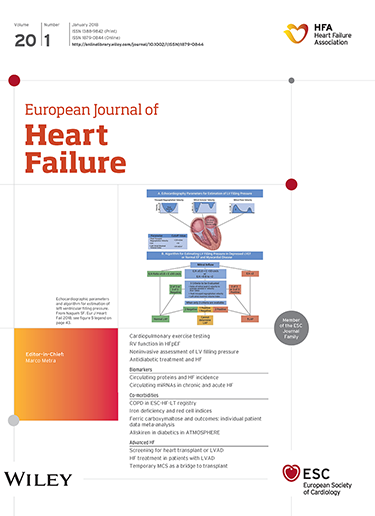The crosstalk between immune activation and metabolism in heart failure. A scientific statement of the Heart Failure Association of the ESC.
IF 16.9
1区 医学
Q1 CARDIAC & CARDIOVASCULAR SYSTEMS
引用次数: 0
Abstract
A better understanding of additional mechanisms of heart failure (HF) progression may allow a different and more complete phenotyping of the disease and identification of novel therapeutic targets. Persistent latent myocardial inflammation/immune activation in HF may represent an attempt to restore tissue homeostasis in the failing heart, where cardiomyocytes and immune cells undergo metabolic reprogramming, which allows them to deal with decreased availability of nutrients and oxygen. This status can trigger a metabolic crosstalk between immune cells and cardiomyocytes which, depending on the outcome, can either perpetuate the maladaptive remodelling of the heart, or determine an adaptive response. Therefore, the interplay between immune activation and metabolism is gaining recognition as a potential therapeutic framework. On these premises, future studies addressing novel HF treatments should attempt to evaluate the potential therapeutic role of direct metabolic and immunological crosstalk modulation. The aim of the present scientific statement from the Heart Failure Association of the ESC is to summarize the current evidence for the connection between inflammatory and immune activation and metabolic adaptation in the onset and progression of HF, in order to promote future strategies for the development of targeted-disease preventive and therapeutic measures.心力衰竭中免疫激活与代谢的串扰。ESC心力衰竭协会的科学声明。
更好地了解心力衰竭(HF)进展的其他机制可能会使疾病的不同和更完整的表型和新的治疗靶点的确定成为可能。心衰患者持续的潜伏心肌炎症/免疫激活可能代表了衰竭心脏中恢复组织稳态的尝试,其中心肌细胞和免疫细胞进行代谢重编程,这使它们能够应对营养和氧气可用性的减少。这种状态可以触发免疫细胞和心肌细胞之间的代谢串扰,这取决于结果,可以使心脏的不适应重构永续下去,也可以确定适应性反应。因此,免疫激活和代谢之间的相互作用被认为是一种潜在的治疗框架。在此前提下,未来针对新型心衰治疗的研究应尝试评估直接代谢和免疫串扰调制的潜在治疗作用。来自ESC心力衰竭协会的这份科学声明的目的是总结目前关于HF发病和进展中炎症和免疫激活以及代谢适应之间联系的证据,以促进未来制定靶向疾病预防和治疗措施的策略。
本文章由计算机程序翻译,如有差异,请以英文原文为准。
求助全文
约1分钟内获得全文
求助全文
来源期刊

European Journal of Heart Failure
医学-心血管系统
CiteScore
27.30
自引率
11.50%
发文量
365
审稿时长
1 months
期刊介绍:
European Journal of Heart Failure is an international journal dedicated to advancing knowledge in the field of heart failure management. The journal publishes reviews and editorials aimed at improving understanding, prevention, investigation, and treatment of heart failure. It covers various disciplines such as molecular and cellular biology, pathology, physiology, electrophysiology, pharmacology, clinical sciences, social sciences, and population sciences. The journal welcomes submissions of manuscripts on basic, clinical, and population sciences, as well as original contributions on nursing, care of the elderly, primary care, health economics, and other related specialist fields. It is published monthly and has a readership that includes cardiologists, emergency room physicians, intensivists, internists, general physicians, cardiac nurses, diabetologists, epidemiologists, basic scientists focusing on cardiovascular research, and those working in rehabilitation. The journal is abstracted and indexed in various databases such as Academic Search, Embase, MEDLINE/PubMed, and Science Citation Index.
 求助内容:
求助内容: 应助结果提醒方式:
应助结果提醒方式:


